



 The Accurate Reloading Forums
The Accurate Reloading Forums  THE ACCURATE RELOADING.COM FORUMS
THE ACCURATE RELOADING.COM FORUMS  Hunting
Hunting  American Big Game Hunting
American Big Game Hunting  Bitching about wolves...
Bitching about wolves...Go  | New  | Find  | Notify  | Tools  | Reply  |  |
| One of Us |
It seems regardless of the issue, you can find some sort of eggspurt quoting numbers from some outcome driven research or just bullshit numbers grabbed out of the sky. Aim for the exit hole | |||
|
| One of Us |
Yea, you're right. Wide open spaces of wild country that's critical habitat for mule deer, elk, antelope, moose, game birds, and small game is pretty much worthless. I sure wish all of this energy development (wind, oil and gas, in situ uranium, coal) we're seeing in Wyoming to support the rest of the nation could be in all of your back yards and favorite hunting spots too. | |||
|
| One of Us |
Meh, that's old news! That kind of thing happened where I grew up more than 30 years ago. It's called the 'sub-division'. Hundreds of mcMansions clustered so tightly together there is barely enough room to run a push mower between the houses. ~Ann 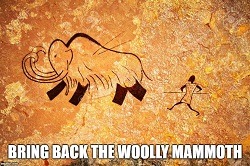 | |||
|
| One of Us |
Yea? How's the elk, antelope, moose and mule deer hunting in those places? | |||
|
| One of Us |
Actually, overrun with whitetails (all that expensive landscaping and vegetarianism) but the urbanites only see value in food from the grocery store. ~Ann  | |||
|
| one of us |
Now we will have more aspen to eat! The return of gray wolves has dramatically altered the landscape in portions of Yellowstone National Park, as new trees take root in areas where the predators have curbed the size of foraging elk herds, according to scientists in a new study. Stands of aspen, willow and cottonwood are expanding in areas where for decades dense elk populations prevented new growth, said study author William Ripple from Oregon State University. While other factors may play a role, from a changing climate to wildfires, more than a decade of research has confirmed earlier assertions that the return of Yellowstone's elk-hungry wolves has spurred new plant growth, he said. The findings from Ripple and co-author Robert Beschta will be published in the scientific journal Biological Conservation. The study already has been released online. Wolves are "apex predators, on top of the food web," Ripple said. "They're more than just charismatic animals that are nice to have around. We're finding that their function in nature is very important." Wolves have spin-off benefits, too, the researchers said: As trees grow taller, the stands provide more habitat for yellow warblers and other songbirds and more food for beavers, which in turn construct ponds that attract fish, reptiles and amphibians. The phenomenon has been described as a "landscape of fear" in which a predator's pursuit of prey has a cascading effect across the ecosystem. Wolves were reintroduced to Yellowstone from Canada in 1995 and 1996 after being killed off early last century. About 100 now roam the park, thinning elk herd numbers as they feast on the big game animals year-round. Other studies have indicated a single wolf can kill several elk or more each month during the winter. Some scientists dispute the claim that wolves have sparked a restoration among Yellowstone's aspen. In a 2010 study, U.S. Geological Survey scientist Matthew Kauffman agreed that foraging elk were the leading cause of the trees' decline in the park over more than a century. But Kauffman said the decline has continued since wolves returned, even in areas considered risky to elk because they are frequented by the predators. That's because elk alter their behavior only slightly to avoid wolves, concluded Kauffman, who also heads the Wyoming Cooperative Fish and Wildlife Research Unit. Although elk numbers are down by about two-thirds in some areas of the park, herd numbers would have to drop even more for aspen to recover, Kauffman said. Aaron Wirsing, a University of Washington biologist who studies predators' effects on ecosystems, said more than 15 years after wolves first came back to Yellowstone, the debate surrounding their impact continues to stir disagreement. Others have said the work by Ripple and Beschta has not given enough credit to factors such as drought and stream levels. Wirsing said those other factors should not be ignored but added that the emerging consensus is wolves play a central role in the park's landscape. "The weight of the evidence is certainly coming down in favor of wolves having a particularly profound impact on aspects of Yellowstone's ecosystem," he said. Studies on other predators have found similar top-down effects on their surroundings. With fewer lions, researchers said increasing numbers of baboons in sub-Saharan Africa are pushing into settled areas where they raid farmers' crops more frequently and can spread intestinal parasites to humans. And fewer sharks along the East Coast has led to more rays, which in turn eat more scallops, wiping out some local fisheries. One difference in those studies and the work in Yellowstone is that in most other cases, scientists have been left to study what was lost when a predator was gone. In the park, scientists have been able to track what happens after the predator came back. "Being able to look back retrospectively gets us very close to being able to determine the impact of wolves," Wirsing said. Ripple said the results of his work with Beschta suggest wolves also could have positive effects outside Yellowstone. More than 1,600 gray wolves now live in the Northern Rockies, and elk numbers have dropped as a result. But given the backlash wolves have encountered among some ranchers and elk hunters, more research needs to be done to determine how many of the animals are needed to be an "ecologically effective" population, Ripple said. "The question is, how many wolves does it take?" he said. | |||
|
| One of Us |
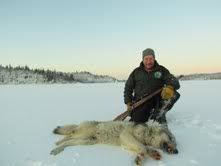 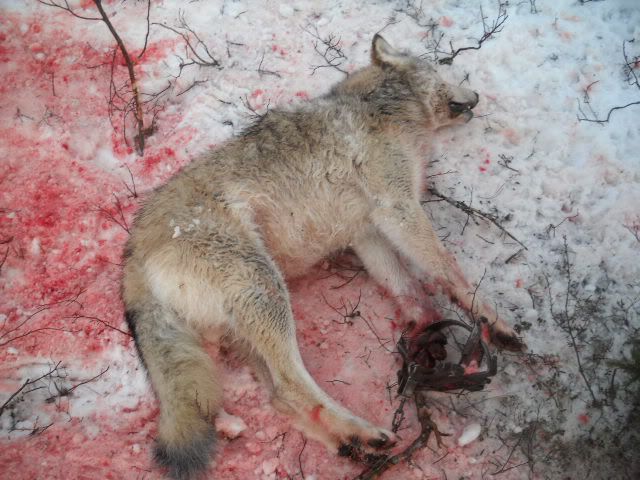   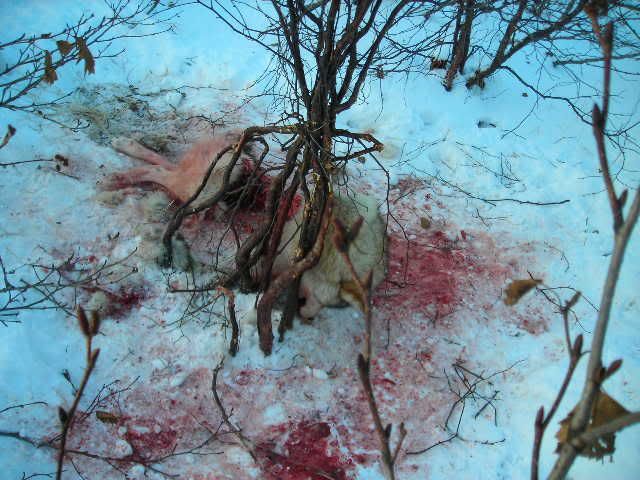  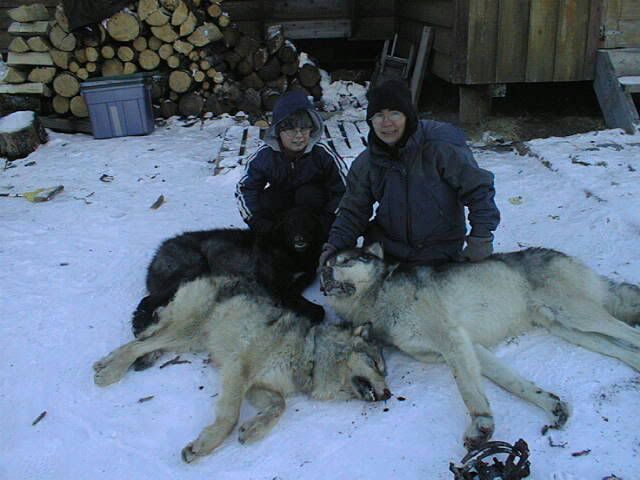  Here's how we deal with wolves at the Lake!! Here's how we deal with wolves at the Lake!! | |||
|
One of Us |
Good pics....keep it up. | |||
|
One of Us |
yup, those are some goood wolves there waterrat. I see you have your shovel, but why take the pics? I don't, er, I mean "wouldn't"... Si tantum EGO eram dimidium ut bonus ut EGO memor | |||
|
| One of Us |
Dear Moose Drool: I'd actually believe it, if you said that you lived in Marin County, California, but Wyoming, cut me a break. You are full of it. By the way, the bullet exits the muzzle of a barrel, that's the end that you point at the elk. Sincerely, Chris Bemis | |||
|
| One of Us |
Moose Drool is the equivilent of DaMan on ARPF ! | |||
|
| One of Us |
And like DaMan, it never really leaves. C. B. | |||
|
one of us |
Matchkings are not hunting bullets.....oops wrong thread. No wait they may not be hunting bullets but I bet they would work well on wolves. -------------------- THANOS WAS RIGHT! | |||
|
| One of Us |
The ups and downs in western big game populations is much more complicated than simply saying predator X is eliminating ungulate Y. Over the years black bears have been blamed foe decimating the Lochsa,ID elk population, coyotes various mule deer and antelope populations, and wolves elk populations in general. Mule deer populations in the west have been in a slow but steady decline since the late 60's. It has been going on since before the introduction of wolves. The huge populations of mule deer we saw in the 50's and 60's was primarily due to the over grazing practices on public lands around the turn of the century. Unrestricted grazing by huge herds of cattle, domestic sheep and horses changed the native habitat from grasslands to browse dominated habitats. Mule deer thrived on winter ranges dominated by sage brush and bitter brush. By the late 60's these brush stands were over 90 years old and dying off of old age. They were returning to grass dominated habitats. Consequently, the browse eating mule deer populations plummeted and the grass eating elk populations surged to record numbers in many locations. In Yellowstone Park elk populations have been over populated for over 50 years. To such a point that at one time the Park Rangers were culling thousands per year. Montana was killing additional elk when deep snows drove them out of the Park. This created a sportsman's black eye with such things as the infamous Gardner firing line. Remember that there is no sport hunting or culling now allowed in the Yellowstone. The wolves reducing the elk numbers there will improve forage conditions for deer and other species and improve the wildlife diversity of Yellowstone Park. Big horn sheep and muld deer may be the biggest beneficiaries. Outside the Park a different set of circumstances exist in relation to wolves and elk. Here we want to maintain hunt able p[populations of elk and moose, the main species affected by unrestricted wolf populations. An aggressive wolf management program that includes wolf population control is needed to maintain the moose and elk populations at levels that will support a reasonable sport hunter off take. I could cover much more of these complications but this should be enough to show that wildlife management is not as simple as kill more wolves, coyotes or name your own predator. 465H&H | |||
|
| one of us |
Well, I will admit that I don't know shit about wolves or their management (oops, lack of management), but I do know first hand about wind turbines and their effect on whitetail deer, which is exactly ZERO effect after the second year. The landowner where I hunt allowed the power company to put several wind turbines on his 1800 acres along with the substation. The effect the first year of construction was that the deer went nocturnal. The second year, the year after construction completion, is that all has returned to normal. If anything, I saw more deer this year than any year in the last 20. The thing to remember about the wind turbines is that they go on the top of the ridges and the deer are more valley and lower land creatures. They may cross the top, but won't stay there. I also have seen the depletion of quail and pheasant in the area, from good numbers to none in three years. The landowner and I both believe it is due to the huge turkey population increase. Turkeys will destroy every other bird nest they can find. Just my observations, I'm not a scientist. Larry "Peace is that brief glorious moment in history, when everybody stands around reloading" -- Thomas Jefferson | |||
|
| One of Us |
Dear 465 H&H: What you report makes a lot of sense. When I lived in Colorado, and often visited Rocky Mountain National Park, you could see the same problems of over-grazing and over-browsing by the elk herds. Until the late 1970's the NPS rangers could shoot the elk, and keep the herd down. The other advantage in Yellowstone was the big fire 10 years ago. It reduced the old growth and allowed other plants to re-produce, producing a huge forage boon for the deer and elk. Unfortunately, the same must happen in RMNP if you intend to have enough forage for the huge herds. I do not believe that the re-introduction of wolves (not really re-introduction, because the Canada timber wolf is not native to the Rockies in the lower 48) will help to balance the herds of elk and deer properly. The wolves will decimate and are now decimating those herds, and in my opinion, cannot be effectively controlled with normal hunting seasons. Eventually, those wolf packs will get a disease (provo?), and be wiped out or at least greatly reduced in number. But the mortal damsge to the game herds will have already happened. Thats no way to manage deer, elk and moose. The people I've conversed with who appear to know what they are talking about, say that to keep the wolves in check requires hunting from aircraft and trapping. Hell, we can't even keep the white tail deer in check with a double season in Philadelphia and the surrounding counties. Sincerely, Chris Bemis | |||
|
| one of us |
Over 20 years ago. Time flies! | |||
|
| one of us |
The Wyoming Game and Fish Dept. has publicly, openly, stated numerous times, the elk have been in steady decline in the Northwest portion of Wyoming since the reintrduction of canadian wolves. In the very beginning the G&F was sceptical, and almost prowolf, and pretty much kept their opinions to the department. But as time passed and more damage became evident, they have pretty much started to talk and admit the wolf has done a tremendous damage to the elk, along with grizzly bears. The G&F and F&W tried to throw drought into the equation, but a funny thing was happening in other parts of Wy. Same drought, state wide pretty much, but in areas with no grizzlies or wolves, elk numbers flourish. The G&F has to work with the F&W, so they tread lightly. | |||
|
| one of us |
Since wolves have appeared around Challis Idaho, I no longer hunt there do to dwindling numbers of elk. I am an out of state hunter and not alone, I wonder what the financial hit is because of the uncontrolled wolf populations? Jim "Bwana Umfundi" NRA | |||
|
| One of Us |
Dear Kudi56: Yup, you're right it was 20 years ago. Damn, I'm getting old. So what happened to Daman, oops, I mean, Drooly? Sincerely, Chris Bemis | |||
|
| One of Us |
Their permanately joined at the rectum! Here's a pic of a moose that the wolves ate from the shoulders back,,still alive for a while anyway! 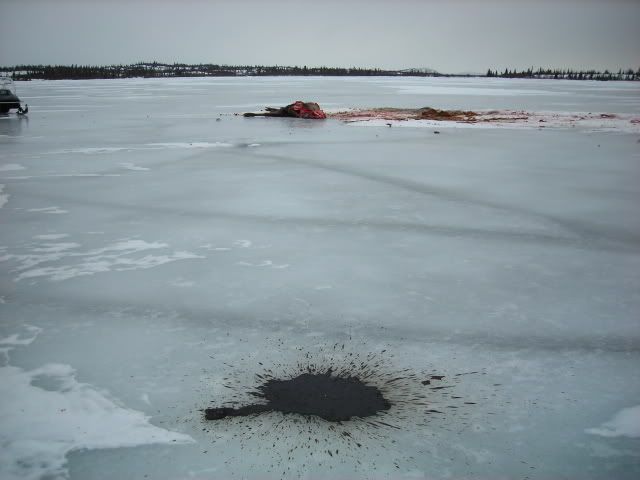 That's a big pile of bloody wolf shit in the foreground.  There is no dying with dignity in the wolf world,,this guy (wolf) got his middle half devoured while waiting for a quick humane death in a snare. There is no dying with dignity in the wolf world,,this guy (wolf) got his middle half devoured while waiting for a quick humane death in a snare. | |||
|
One of Us |
Wolves Suck!!!! | |||
|
| One of Us |
Couldn't have said it better myself. | |||
|
| one of us |
Park Wolves on the move Tony Mandile - Author "How To Hunt Coues Deer" | |||
|
| One of Us |
The first sentence there is complete bullshit. Please google "Pinedale Anticline Mule Deer". I can't disagree with the second sentence. | |||
|
| One of Us |
Is this photo supposed to draw some sort of emotional response? Ever see what happens to a mule deer or elk when it's hit at 75 mph by some jacked up doper who just finished his shift at the rig? | |||
|
| One of Us |
Dear Moose Drooly: Have you finally figured out what the muzzle of a barrel is? We can educate you on this forum, if you wish. Sincerely, Chris Bemis | |||
|
| One of Us |
Well one thing is for sure.......... this site, although informative, sure seems to be a place where people feel very free to act like assholes. Why is that? I guess it is because they can say and act like they want with no real fear of any sort of repercussion. Sure would be nice to see a bit more civility and less smart ass responses on some of these threads. Many of you guys act like you are stuck in a cabin with three feet of snow outside and you have run out of beer. ______________________________________________ The power of accurate observation is frequently called cynicism by those who are bereft of that gift. | |||
|
| One of Us |
"Oh, oh, no." - Mr. Bill, Saturday Night Live. "Nevermind." - Rosanne, Rosanna Danna - Saturday Night Live Sincerely, Chris Bemis | |||
|
| One of Us |
Again the predator prey relationships between pheasants and various predators is not a simple one for one relationship. Mike, answer this question. Why are South Dakota and North Dakota as well as Nebraska experiencing record high pheasant populations (even higher than the golden years of the 40's and 50's)over the past 10 to 12 years. Even though there are more species of predators there now and they are also at record numbers? Another question, If predators are the problem of low pheasant numbers in Idaho, eastern oregon and Washington states, why are mountain quail populations doing very well? Are they immune from predation? | |||
|
| One of Us |
I am not sure where the theory originated that the wolves brought down from Canada are any different than the native wolves that once roamed Idaho, Montana and Wyoming. The imported wolves came from wolf ppopulations just a few hundred miles north of these states. I really doubt that there wasn't a natural exchange between these populations. Several hundred miles is nothing to a wolf. 465H&H | |||
|
| One of Us |
465......... yes I think you have a good point from a genetic perspective regarding traits such as size etc. I believe the big issue, and one that was expressed to me by a Canadian biologist back around the time the wolves were being relocated......... was that the wolves came from an area where the number one prey species for them was elk, followed by moose. So these wolves were use to hunting skittery elk that were in turn use to dealing with wolves. These highly skilled wolves were being released into an area where the elk were many generations removed from dealing with wolves and lacked any sort of learned response. This would result in a significant impact on the elk and moose populations initially and would continue until existing animals developed evasive tactics and responses to wolf predation and in turn passed this along to future offspring. This is just the short version of what is a very complex topic. ______________________________________________ The power of accurate observation is frequently called cynicism by those who are bereft of that gift. | |||
|
| One of Us |
Skyline great point. I really think the elk in many states were vastly overpopulated and probably acted a lot like cattle. They will behave like proper wild elk soon. I've noticed in the UK that I can stalk the little roe deer around here a lot easier than whitetails. It must have something to do with the absence of apex predators. | |||
|
| One of Us |
Dear Calgary & Skyline: You might want to have a little discussion about your theory versus application of wolf predation on elk and mule deer with Ray Atkinson, who actually lives in Idaho, where these little grey eating machines were "introduced". You might find it enlightening. Sincerely, Chris Bemis | |||
|
| One of Us |
Not my theory. Simply relaying what I was told may be an issue during the time of the wolf relocation to Yellowstone. However, I would be interested in hearing what he has to say. Personally I have seen wolves wipe out entire watersheds where I use to guide. Lived my whole life in wolf country. Even lost a horse or two to them over the years. Game populations can get down to a point where it is impossible for them to recover due to pressure from wolves. The only cure in those instances is to thin the wolves down to the point that the game can recover. This is the situation in some areas with woodland caribou in parts of western Canada. With elk and moose there are other factors of course........ not just wolves. Bears can have a big impact on calf survival, etc. The terrain and habitat can also be a big part of the equation and no two predator/prey problems are carbon copies of one another. It is a complex issue and as with many things, I believe the truth is somewhere in the middle. Unfortunately wolves are one of those issues where people tend to love em or hate em. We also live in a time when non-hunters have a big impact on things and politics plays more of a roll in wildlife management than it should. When you take a game departments ability to actually manage wildlife away from them it just leaves hunter management. ______________________________________________ The power of accurate observation is frequently called cynicism by those who are bereft of that gift. | |||
|
| One of Us |
And just wait and see what happens when the WY state legislature starts work on changing the wording of the current wolf statue. Personal agendas and ignorance amongst the legislators is going to muck things up to the point that I would be suprised if they make the required changes the USFWS would agree to...hence, prolonging delisting even longer. | |||
|
| One of Us |
without congressional protection it is a mute point. MIGHT AS WELL DELIST, WE ALREADY HAVE | |||
|
| One of Us |
It apears that what he said may be correct. In fact hunters have noticed a shift in elk use areas and in the type of habitat that they use after wolf reintroduction. In addition the average herd size has increased. Elk will learn to avoid wolf predation to some extent. But in the final analysis the question is can hunting alone control wolf population levels to the necessary degree. Idaho doesn't think so and in fact have opened wolf hunting to electronic calling (not allowed for other big game species) and trapping. It will take some experimentation to find the amount of control that is necessary. 465H&H | |||
|
| One of Us |
A man, a plan, a can a ammo, a cessna, something in black, perhaps of the .223 persuasion, maybe .308, semi-auto hi-cap mags, and voila!.. And, of course, someone ridin shotgun in said cessna, with the ability and inclination to hit furry grey moving targets.. Ahhh.... Puts a smile on yer face just thinkin about it, don,t it?!.. | |||
|
| one of us |
Sarah Palin had the best wolf management:$150 bounty limit of 10 a day and shooting from the air allowed.This woman loves hunting and hunters but they would rather have a gun grabber like mitt romney !!! | |||
|
| Powered by Social Strata | Page 1 2 3 4 |
| Please Wait. Your request is being processed... |
|
 The Accurate Reloading Forums
The Accurate Reloading Forums  THE ACCURATE RELOADING.COM FORUMS
THE ACCURATE RELOADING.COM FORUMS  Hunting
Hunting  American Big Game Hunting
American Big Game Hunting  Bitching about wolves...
Bitching about wolves...

Visit our on-line store for AR Memorabilia

